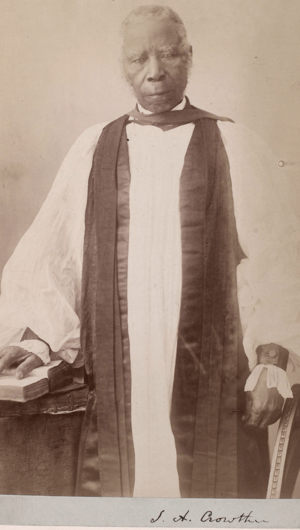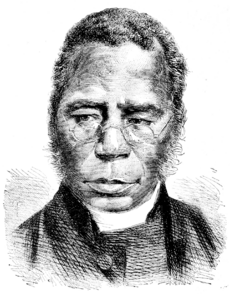Samuel Ajayi Crowther facts for kids
Quick facts for kids The Most Reverend Samuel Ajayi Crowther |
|
|---|---|
| Primate of all Nigeria | |

Crowther as bishop in 1867
|
|
| Church | Church of Nigeria |
| See | Bishop of the Niger |
| In Office | 1864–1891 |
| Personal details | |
| Born | c. 1809 Osogun, Oyo Empire |
| Died | 31 December 1891 (aged 82) Lagos, Lagos Colony |
| Education | St Mary's Church; Fourah Bay College; Oxford University |
Samuel Crowther (c. 1809 – 31 December 1891) was an important Yoruba linguist and clergyman. He became the first African Anglican bishop in West Africa. He was born in Osogun, which is now in Oyo State, Nigeria.
When he was about twelve years old, Samuel and his family were captured by Fulani slave raiders. This happened during the Yoruba civil wars, around 1821. His village was attacked and destroyed. Ajayi was then sold to Portuguese slave dealers. They put him on a ship to be taken across the Atlantic Ocean to the New World.
Luckily, Crowther was freed from slavery at a port by the Royal Navy's West Africa Squadron. This British group was working to stop the Atlantic slave trade. The freed people were taken to Sierra Leone. There, Ajayi chose the English name Samuel Crowther. He started his education and learned English. He became a Christian and joined the Krio ethnic group in Sierra Leone. He studied many languages and became a minister in England. Later, he earned a special degree from Oxford University. He wrote a Yoruba grammar book and translated the Anglican Book of Common Prayer into Yoruba. He also worked on a Yoruba version of the Bible and other language projects.
Contents
Samuel Crowther's Early Life
Samuel Ajayi Crowther was a grandson of King Abiodun through his mother, Afala. In March 1821, when he was about 12, he and his family were captured. Fulani slave raiders took them and sold them to Portuguese slave traders. His mother, Afala, who later became Hannah, and his younger brother were also captured. His father, Ayemi, likely died during the attack on their village.
The British government had made the Atlantic slave trade illegal in 1807. They used their navy to patrol the coast of Africa. At that time, Spain and Portugal still allowed the slave trade in their colonies. Before the slave ship left for the Americas, a British Royal Navy ship stopped it. Captain Henry Leeke led the British crew. They freed the captives, including Ajayi and his family. They took them to Freetown, Sierra Leone, where they were settled.
While in Sierra Leone, the Anglican Church Missionary Society (CMS) helped Crowther. He was taught English. He was very smart and quickly learned to read the Bible easily. He decided to become a Christian. On December 11, 1825, he was baptized by John Raban. He named himself after Samuel Crowther, a church leader in London.
In Freetown, Crowther became very interested in languages. In 1826, he went to England to study at St Mary's Church in Islington. This school had a history of helping free Africans. He returned to Freetown in 1827. He was the first student at the new Fourah Bay College, an Anglican school. Because he loved languages, he studied Latin and Greek. He also learned Temne, a West African language. After finishing his studies, Crowther began teaching at the college.
Crowther's journey as a missionary to Yoruba country (now Nigeria) started in 1841. He joined the Niger Expedition as a missionary. In 1843, he visited England again. He gave a great report about the expedition and showed his special talents. Because of this, he was chosen for the CMS project in the Yoruba mission and became a priest. In 1846, Crowther and Rev. Townsend opened the CMS mission in Abeokuta. He also helped start missions in Niger during the 1854 Niger Expedition.
Samuel Crowther's Family Life
Crowther married a schoolmistress named Asano, who was baptized as Susan. She had been a Muslim before. She was also freed from a Portuguese slave ship in 1822. She was among the captives settled in Sierra Leone and also became a Christian.
They had several children. Their son, Dandeson Coates Crowther, later became a church leader. In 1891, he became an archdeacon in the Niger Delta. Their second daughter, Abigail, married Thomas Babington Macaulay. Their son, Herbert Macaulay, was Crowther's grandson. He became one of the first important Nigerian nationalists.
Samuel Crowther's Missionary Work
Crowther was chosen to go with missionary James Schön on the Niger expedition of 1841. They were supposed to learn Hausa for the trip. The expedition aimed to boost trade, teach farming, spread Christianity, and help end the slave trade. After the expedition, Crowther went back to England. There, he trained to be a minister and was ordained by the Bishop of London. Schön wrote to the Church Missionary Society, saying how helpful Crowther was. He suggested Crowther should become a minister.
Crowther returned to Africa in 1843. With Henry Townsend, he opened a mission in Abeokuta, in what is now Ogun State, Nigeria.
Crowther started translating the Bible into Yoruba. He also began putting together a Yoruba dictionary. In 1843, his grammar book was published. He had started working on it during the Niger expedition. A Yoruba version of the Anglican Book of Common Prayer came out later. Crowther also created A Vocabulary of the Yoruba Language. This book included many local proverbs and was published in London in 1852.
After the British Niger Expeditions of 1854 and 1857, Crowther published an Igbo primer. A young Igbo missionary named Simon Jonas, who traveled with him in 1857, helped with this. Crowther also published a primer for the Nupe language in 1860. A full grammar and vocabulary of Nupe followed in 1864.
Crowther became good friends with Captain James Pinson Labulo Davies. Davies was an important politician, sailor, and generous person in colonial Lagos. The two men worked together on social projects in Lagos. For example, they helped start The Academy on October 24, 1866. This was a place for public learning and culture. Crowther was its first patron, and Captain J. P. L. Davies was its first president.
Samuel Crowther's Achievements
In 1864, Crowther made history. He became the first African bishop of the Anglican Church. He was made a bishop on St Peter's Day in 1864. Charles Longley, the Archbishop of Canterbury, performed the ceremony at Canterbury Cathedral. Queen Victoria gave permission for Crowther to become "Bishop of the United Church of England and Ireland in the said countries in Western Africa."
He continued his studies and later received a special degree called Doctor of Divinity from Oxford University. He even met Queen Victoria. He read the Lord's Prayer to her in Yoruba. She said it sounded soft and beautiful.
In March 1881, he and his son Dandeson Crowther went to a meeting on the island of Madeira. This island is west of Morocco in the Atlantic Ocean. Crowther had started working on other languages besides Yoruba. But he kept overseeing the translation of the Yoruba Bible (Bibeli Mimọ). This important work was finished in the mid-1880s, a few years before he passed away.
Samuel Crowther is honored on December 31st. This is a special day on the church calendar for some Anglican churches, like the Church of Nigeria.
Samuel Crowther's Death and Burial
Samuel Crowther died in Lagos on December 31, 1891, at the age of 82. He passed away from a stroke. He was first buried at Ajele Cemetery in Lagos.
In 1971, the Lagos State Government wanted to build new offices where the cemetery was. They told the families of those buried there. Seth Kale, the Anglican Bishop of Lagos, worked with Crowther's family. They delayed moving his remains until 1976. A special ceremony was held at a new burial site. A cenotaph (a monument for someone buried elsewhere) was put up at Cathedral Church of Christ, Lagos.
 | Shirley Ann Jackson |
 | Garett Morgan |
 | J. Ernest Wilkins Jr. |
 | Elijah McCoy |


